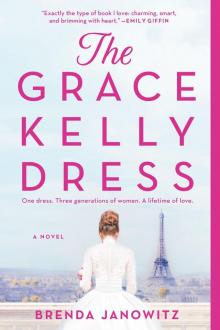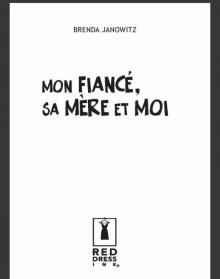- Home
- Brenda Janowitz
The Grace Kelly Dress Page 15
The Grace Kelly Dress Read online
Page 15
“You’re not in mourning,” Drew said, looking at Rocky, his eyes soft. Sad. “It’s the immediate family who does the rending of the clothing. You don’t have to do it. You’re not supposed to do it.”
“I want to,” Rocky said, and got a good grip on the button side of her shirt. She pulled once again and the fabric gave way. Rip. The sound was so satisfying. She did it again. Ripped harder. “I love you. You’re a part of me.”
Drew took her face in his hands and looked deeply into Rocky’s eyes. She could see the tears beginning to form just as he kissed her.
“I love you,” he said back to her. “You’re a part of me.”
“What can I do?” Rocky asked. “How can I help?”
“I don’t know,” Drew said. “I don’t even know how to feel. This person, this person I never met, is dead, and I don’t know how to feel about it.”
“I don’t think there’s a wrong way and a right way to feel. It’s a lot to process.”
“She was my mother,” he said quietly.
“She was.”
“And I never got to meet her,” he said, even softer now. “Never got to know her.”
“I know,” Rocky said. “I’m sorry. I’m so, so sorry.” Rocky tried to remember what it had been like when her father died—What had she needed at the time? What could she do to help Drew?—but she’d been so young when it happened. There was nothing anyone could have said to her that would have helped. Nothing anyone could have done. Her whole world collapsed in on itself that day. And life was never really the same since then.
Drew shook his head solemnly. “I just remembered. You’re not supposed to look in the mirror if you’re mourning.”
“Oh,” Rocky said, and looked around for something with which to cover it.
Drew grabbed a throw blanket off the couch and draped it across the mirror. It was too heavy—in the coming days, they’d replace it with a sheet—but for now, it would do.
“What else do we need to do?” Rocky asked, glancing across the living room, as if the answers were there, if only she looked hard enough.
“I don’t know,” Drew said, shaking his head. “My mom would know.”
“Do you want me to call your mom?”
“I don’t know,” Drew repeated, a faraway look washing over his face.
Rocky considered Drew’s words from earlier—everyone has a different way of dealing with things, life was not always black and white, and sometimes you just need a minute to process. He might not always deal with things the way that Rocky did, and that was okay.
“Let’s sit down,” Rocky said, and guided Drew to the couch. “Why don’t you take a few minutes to yourself. Do you want me here, or should I give you space? Just tell me what you need.”
“Stay,” Drew said, and grabbed Rocky’s hand. He hugged her deeply, and then as the tears began to fall, he sank lower. He rested his head on her lap, and they sat silently like that, Rocky running her hands through Drew’s hair, for the whole night.
Thirty-Eight
The mother of the bride, as a bride herself
Long Island, 1982
“I’m sorry,” Joanie’s mother said as she turned on the coffee maker the following morning. Joanie was taken aback—it was as if her mother was reading her mind. Did she know that Joanie had discovered the truth about her sister just hours before?
“I can’t believe you didn’t tell me the truth,” Joanie said quietly, her voice barely a whisper.
“I should never have made you feel as if you couldn’t change my wedding dress. Matthew will be standing at the end of that aisle, waiting for you in his brand-new tuxedo. You should have a dress that feels new.”
“Oh,” Joanie said, understanding that she and her mother were having two separate conversations. “The dress.”
“Yes,” her mother continued, impatient to get her point across. “It belongs to you now. I gave it to you. You can do with it whatever you please.”
“I wasn’t talking about the dress.”
“Well, be that as it may, you can change the sleeves if you’d like. You can change anything. I shouldn’t have made you feel otherwise.”
“I don’t want to talk about the dress!” Joanie slammed a hand down onto the table. She was surprised at how forcefully the words had come out. She never raised her voice to her mother.
“Oh?” Birdie regarded her.
“Michele,” Joanie said, careful to keep her voice calm, measured. “You didn’t tell me the truth about Michele.”
“I’m afraid I don’t understand.”
“I know how Michele really died. I know the truth now. What I don’t know is why I had to find out from someone else.”
“I did tell you the truth. Your sister had a heart attack.” Birdie looked down at her hands. She brought them together and squeezed tightly.
“She had a heart attack because she overdosed on drugs.”
Her mother cleared her throat but didn’t say a word. Joanie’s voice punctured the silence: “Didn’t she?”
“Yes.” Her voice barely a whisper.
“So, you told me the truth. But you didn’t tell me the important part.”
“I told you the truth.”
“You didn’t tell me the whole truth.”
“Your father and I decided to keep the part about the drugs quiet. It was bad enough that we’d lost your sister. We didn’t want to sully your sister’s memory. We didn’t want to compound our grief with judgment.”
“Did you know that she was doing drugs?”
“Of course not,” Birdie said. “How could you ask me that? If we’d known, we could have gotten her help.”
Joanie considered this. “I think people would have understood. I don’t think you had to hide the truth.”
“You cannot possibly think that.”
Joanie shook her head. She had gotten off track. It wasn’t important when Michele had started the drugs or whether or not her parents had known about it. It wasn’t important what they told people about how she died. “But I’m not the neighbors. I’m not Daddy’s work colleagues. I’m not some ‘people’ that you can’t tell. I’m your daughter. I had a right to know.”
Birdie remained silent, and Joanie glared at her. Demanded that she respond. Joanie raised her voice: “How could you hide something like that from me? She was my sister.”
“I told you what I thought you could handle,” Birdie answered quietly.
“What’s that supposed to mean?” Joanie’s voice was loud, out of control. But she didn’t want to control it. She wanted to yell. She wanted to scream. She wanted to hurt her mother as much as she’d hurt her.
“You were too young to understand. It was too much.”
“I may have been too young three years ago, but I’m now twenty years old. I’m an adult. There were a million different times you could have told me the truth.”
“You may be twenty years old, but you are still not a grown-up.” Birdie spoke softly, quietly. She walked over to the sink and ran cold water over her hands, pressed them to her neck, to her forehead.
“I am a grown-up. I’m engaged. You can’t get any more grown-up than that.”
“You are a woman, engaged to be married. But in many ways, I’m afraid, you’re just a girl.”
Thirty-Nine
The seamstress
Paris, 1958
The atelier was perfectly quiet. Julien had left work to have an early dinner with Charles, and the last seamstress had just gone home for the evening. Rose reveled in the silence. She’d never had the atelier all to herself before, and it felt more sacred than a church. She looked around the space—the reams of fabric, the dress forms tacked with works in progress, and Madame’s delicate drawings, all across the walls.
If Julien’s plan worked out, this would belong to her. As long
as she stayed the course and delivered a perfect wedding gown to Diana, then they would announce her as Madame’s protégé, that she would be taking over the atelier. They would stay in business and Rose would have the thing that had always eluded her: security. In moments like these, they seemed so close to saving the business. But in others, it was like in a dream, where you reach and reach, but cannot grasp the thing you want, until finally, it disappears.
A slight knock on the door drew her back from her reverie.
“Am I too late?” he asked, as the chime rang out. Rose could barely believe her eyes. It was as if the universe knew her most secret desire and delivered it to her: Robert. “I’ve brought the check for Julien. You’ll have to accept my apologies—my mother called this afternoon and was horrified that I hadn’t brought it sooner. Apparently, it was due once Diana approved the sketch as final.”
“That’s all right,” Rose said, running a hand through her hair to smooth it down. “Julien’s not here right now. I can leave it on his desk.”
“I don’t want to keep you, if you’re trying to get home. Or if you have plans for the evening.”
“It’s no trouble at all,” Rose said. “I assure you.”
Their fingertips touched as Robert handed her the check. Rose quickly drew her hand back. As she rushed off to Julien’s office to leave it on his desk, she reminded herself that she mustn’t think about Robert. The only thing that was important was the money he’d just given her. Keeping the atelier afloat.
Rose placed the check on the center of Julien’s desk and grabbed her coat. She should leave for the evening and stop dreaming. Perhaps the fresh air was just what she needed, would help to clear her head.
Rose walked back into the main room of the atelier and was surprised to find Robert still standing there. “You’re still here.”
“Well, you mentioned that Julien wasn’t here,” he said. “I thought you might need someone to walk you home.”
“Why, thank you,” Rose said, struggling to keep her composure. “But I assure you, that’s hardly necessary.”
“I know it’s not necessary,” Robert said.
Rose looked in his eyes to parse his meaning. Did he feel the same way that she did? That would be impossible. After all, Rose had seen his fiancée, and she was the very picture of what every man wanted in a woman. She mustn’t read into things. He was simply being a gentleman, nothing more.
“I’m on my way home,” Robert explained. “And I would be happy to have the company.”
Without thinking: “Yes.”
Robert opened the door for Rose to leave first, and then waited patiently as she locked up for the evening. He placed his hand on the small of her back as she stepped onto the sidewalk. The night air was warm, and Rose took a deep breath in so as to enjoy the moment, memorize it.
“I’m this way,” Rose said, pointing in the direction of her usual walk home.
“Lead the way.”
“I don’t want to take you too far off your course.”
“Why don’t you let me worry about that?” Robert smiled warmly at her.
They crossed the street and made their way towards Rose’s boarding house. Rose noticed that Robert walked on the outer part of the sidewalk, with Rose on the inside of the sidewalk, the true mark of a gentleman. If a car veered off the road and onto the sidewalk, he could protect her.
“Elisabeth cannot wait to meet Madame,” Robert said. “That was very kind of Julien to get an appointment for her.”
“Of course,” Rose replied, and immediately felt her hands get hot at the mention of Madame’s name. She quickly changed the subject: “How did the two of you meet?”
“It wasn’t so much a meeting,” Robert said. “Elisabeth and I have known each other our whole lives. Our families were always close, and our fathers always worked together. I can’t recall a time when I didn’t know Elisabeth. And I can’t recall a time when it wasn’t a foregone conclusion that we’d get married.”
“You were soul mates. How utterly romantic.” Of course they had the perfect how-we-met story. Of course they were meant to be.
Lost in her thoughts, Rose stepped out into the street without looking. It all happened so quickly. Before she knew it, she felt Robert’s strong hands around her body, quickly drawing her back to the curb. Rose gasped as the realization of what had happened slowly came over her—Robert had saved her from a car driving down the street. She fell into his arms as he held on tight.
“I’ve got you, Rose. You’re all right.”
“I beg your pardon,” Rose said, regaining her footing and releasing her grip on his arms. “I should have been more careful.”
“You’ve got nothing to apologize for. I’m just concerned about you.”
Rose looked up at Robert. “I’m perfectly fine now.”
“Seems you do need someone to walk you home, after all,” Robert teased, as they resumed walking.
“I can take care of myself,” Rose said, straightening her back.
“All evidence to the contrary.”
Rose couldn’t help but laugh. Robert laughed, too, the timbre of his voice deep and throaty. It was a laugh Rose wanted to hear again and again. They walked in silence for a few more blocks, Rose’s skin still alight from the feel of Robert’s hands on her body.
“This is me,” she said, pointing towards her boarding house.
“I’ll see you to the door,” Robert said, placing his hand on the small of Rose’s back protectively as they crossed the street. “If I were to let anything happen to the woman responsible for my sister’s wedding dress, I’d truly never hear the end of it.”
“Is that the only reason why you saved me?”
Their eyes met. Rose quickly turned towards the front door. “Well, you can let your sister know, I’m perfectly safe.” Rose took the key out of her pocket and turned the lock. “Thank you for walking me home.”
“You are very welcome,” Robert said, standing back on the sidewalk, waiting for her to get inside safely.
Just before the door closed, Rose heard Robert say quietly: “Until next time.”
Rose knew that there wouldn’t be a next time. The only person he would be walking home in the future would be his beautiful fiancée. But still, she went to sleep that night replaying the walk home over and over again in her mind.
Forty
The bride
Brooklyn, 2020
She should never have left them alone. In the six minutes since she excused herself from the table, all hell had broken loose. They were at her office, in her conference room, so Rocky had assumed that she’d have the home court advantage. That she’d be in control. She was wrong. Very, very wrong. The meeting was totally and completely out of her control.
Rocky needed to be back in control. The last week had gone by in a blur—they hadn’t sat shiva for the week, not exactly, but both Drew and Rocky took short days at work and met at home each afternoon to be together. Rocky stayed by Drew’s side, talking things out, letting him yell, letting him cry, letting him deal with the trauma of what he’d learned. It was going to take a lot longer than a week to heal, but it was a start.
“We’ve got your hashtag,” Amanda gushed. She took a big swig of champagne and passed a flute to Rocky.
“My what?” Rocky asked. She set her champagne glass down on the conference room table. She would not be drinking at this meeting. She had a full afternoon of work meetings to get through. Of course, her sister had no such strains on her time or attention. Amanda had taken a personal day.
“Your hashtag,” Amanda said, as if it were obvious. “Every wedding needs a hashtag.”
“I don’t think my wedding needs a hashtag,” Rocky said. “Maybe we should slow down on the champagne.” Rocky reached over to grab her sister’s glass, but Amanda was quicker than she was and had the glass away from Rocky�
��s hand before she could get close.
“It’s prosecco,” Amanda said, and then took a big swig of it, as if to prove her point.
“You totally need a hashtag,” the wedding coordinator, Emily, said with a deep vocal fry. Rocky regarded her. She was twenty years old and barely ever looked up from her phone. Rocky felt an overwhelming sense that she should never have hired her. Half of her coding staff at the office was twenty years old, true, but this wedding coordinator seemed different. More twenty. Twenty-er. Twenty going on twelve.
Amanda cleared her throat. “I was thinking, it’s all good, man.”
“Cute,” Emily said, eyes on her phone.
“Are you quoting from Breaking Bad right now?” Rocky asked her sister. How had this meeting gone so off the rails? How long had she actually been in the bathroom? “The TV show about meth dealers?”
“Technically,” Amanda said slowly, “I’m quoting from Better Call Saul, the show about the meth dealer’s lawyer, but poh-tay-toh, poh-tah-toh.”
“Cute,” the wedding coordinator repeated. “But, that’s not a hashtag. This is a hashtag—”
Emily put her iPhone down and picked her iPad up. She smiled as she slowly turned the iPad screen around for the big reveal: #FoundAGoodMan.
“You cannot be serious,” Rocky said.
“Get it?” she asked. “Because Drew’s last name is Goodman?”
“Oh, I get it, all right,” Rocky said, her voice drifting off. She looked at her sister, hoping they were thinking the same thing: that this wedding coordinator must be fired. Immediately. As she puzzled over a nice way to say Don’t call us, we’ll call you, Amanda jumped in.
“Oh, that’s a winner,” Amanda said, and then dramatically grabbed the iPad from the wedding planner’s hands. She gave it a hug and smiled. Why? Rocky did not know.
“Let’s put a pin in that,” Rocky said, reaching for Emily’s iPad. But Amanda would not let go. “Where are we on getting the permits to throw the party on our rooftop?”

 The Grace Kelly Dress
The Grace Kelly Dress Scot on the Rocks
Scot on the Rocks Scot on the Rocks bm-1
Scot on the Rocks bm-1 The Lonely Hearts Club
The Lonely Hearts Club Jack With a Twist bm-2
Jack With a Twist bm-2 Based On A True Story (brooke miller)
Based On A True Story (brooke miller) The Dinner Party: A Novel
The Dinner Party: A Novel Mon fiancé, sa mère et moi
Mon fiancé, sa mère et moi Hollywood Punch
Hollywood Punch